#limbus company analysis
Text
You know, despite the fact that the Tearful Thing's storyline is often overlooked in analysis of Canto IV I feel like it's actually very significant that Yi Sang and the Tearful Thing are actually paralels in a lot of ways. It all started with them making a simple wish to share happiness with others, and that wish led them to knowledge or power that would eventually be exploited.
Think about Yi Sang's situation in N Corp where, much like the Tearful Thing, he's kept locked away and dehumanized, being "harvested" for the mirror and forbidden from interacting with others while being intentionally kept in a state of perpetual misery while the other workers at N Corp altered what he produced in that isolation for their own gain without any interest on where what they are handling truly originated and with what purpose it came to be, exactly like how the Tearful Thing is treated by K Corp researchers.
The fact that his final monologue CG happens in front of the vat, with the screens that were used to overwhelm the Tearful Thing with sadness and despair so that it would keep crying and producing more material for K Corp, now showing Yi Sang's own memories of regret and sadness and despair instead feels extremely deliberate. Not to mention the fact that his EGO is called "Crow's Eye View"
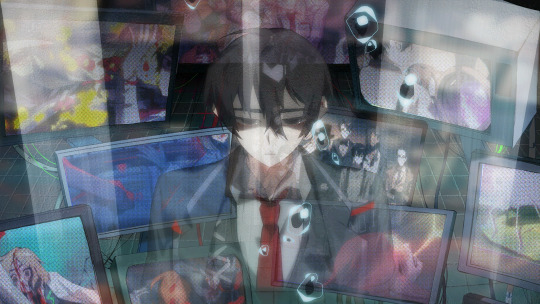
225 notes
·
View notes
Text
ok i was cooking up another hong lu analysis thing bc i noticed SEVERAL things in his base id art the other day and wanted to share with the class but they just dropped a new one in the canto V trailer and i have some stuff i wanna talk about that one:)
My Hong Lu knowledge and interpretation is very heavily influenced by reading Dream of the Red Chamber, which may not be the best because I don’t know how much Limbus will pull from the book because it’s Long as fuck but I think it’s given me a deeper knowledge of Hong Lu.
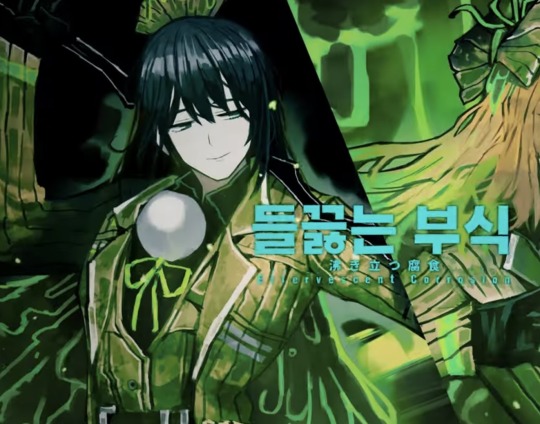
Keep in mind this ego is NOT out yet so i could be totally off base depending on what the full animation/corrosion/sin affinities are like and this is totally theorizing but I wanted to have a go at anyway!! And this got totally out of hand so reading is appreciated :)
One of the first things I noticed here is this Hong Lu seems VERY Bao-yu. We still don’t know for sure what Hong Lu is within the context of Red Chamber (i don’t think it’ll be straightforward considering how that book works) but it’s important to note!
He has this little hat on (this is the best pic i can get atm to show it’s not a fancy hair tie, unfortunately the footage we have rn is a little scuffed)
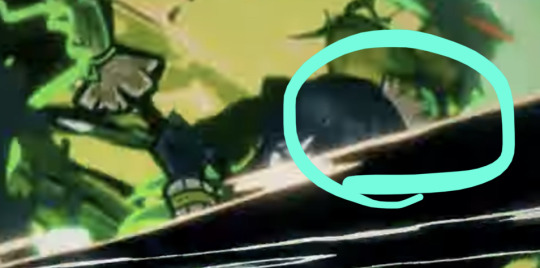
and Bao-yu is ALWAYS depicted with a hat like this.
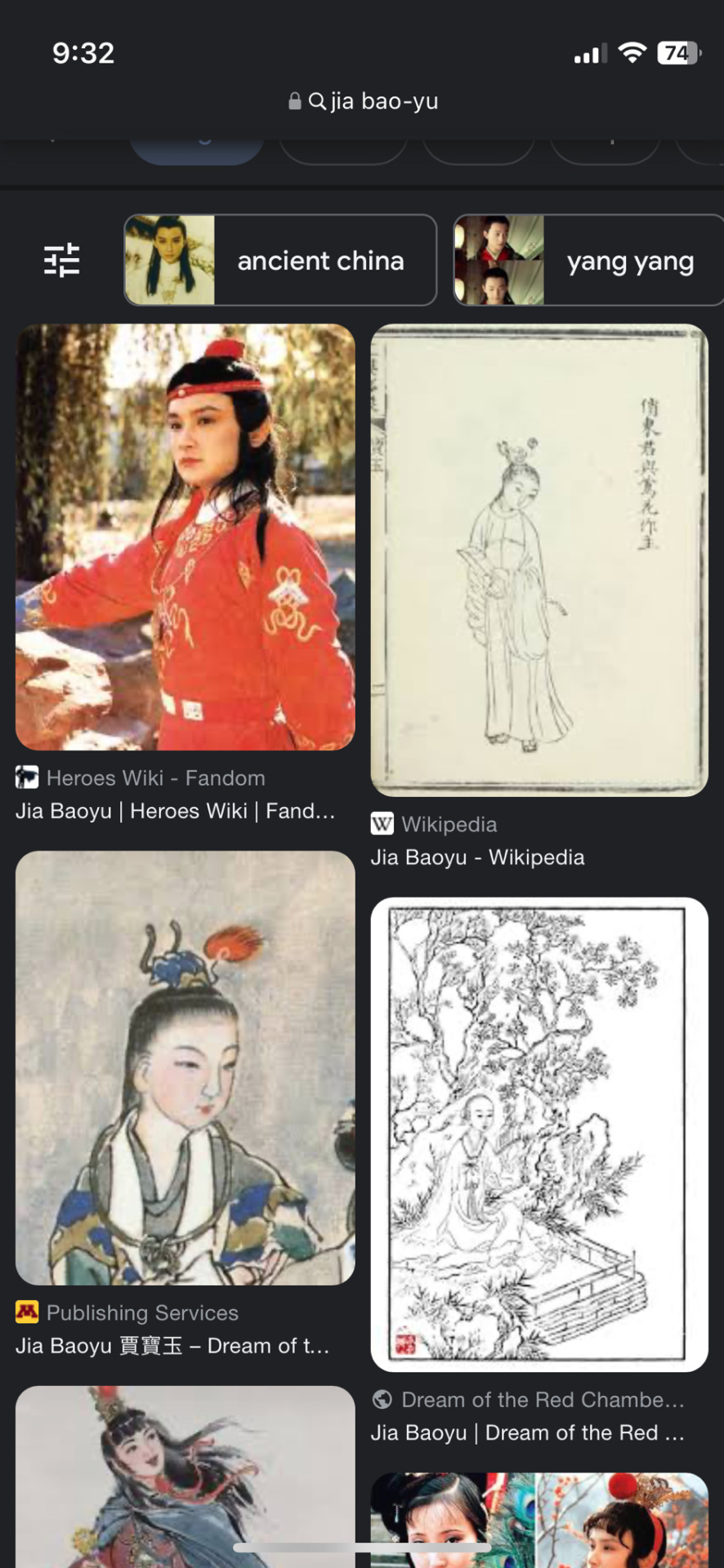
This could just be because that’s the appropriate outfit for Chinese nobility (I unfortunately have little to no reference point here, feel free to correct me, but from some quick searches hats aren’t ubiquitous and ESPECIALLY not ones of this style.) I think it’s worth noting because it comes up in nearly all modern depictions of Bao-yu.
There’s also the pearl Hong Lu is wearing on his neck/chest area, which is where Bao-yu wears the magic jade he was born with. His jade is translated into Limbus as Hong Lu’s jade eye, but this plus his hat and the abno’s themes REALLY makes me think we are dealing with some Bao-Yu stuff here.
Speaking of the Abno’s themes, now i can actually go over them! All we have for Walking Pearl right now is the MD event (as well as general observation), but there’s a few things that are relevant.
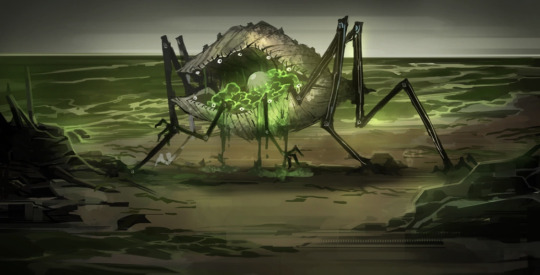
Just based off design, the abnormality seems to be mostly about the precious (the pearl) and the filth (the muck) intermixing. which makes sense with the EGO being named “Effervescent Corrosion” and our holders being Hong Lu and Rodya.
There’s some symbolism around greed/wealth (the offspring filled muck desiring the pearl and fighting for which one will earn it? the muck tarnishing the pearl? ) and I think we should read into that because it’s Hong Lu and Rodya who have this one and they’re both very tied to their financial status. Those two sharing an ego makes me insane for a bunch of reasons but that’s probably for another analysis piece! But duality is REALLY important for those guys and that’s a theme they’re emphasizing here with both the pearl and muck within the clam.
There’s also some elements of shelter/protection/potentially entrapment with the clam’s shell which are HUGE for Hong Lu, especially with his egos so I think those may come up.
But mostly it’s about the mixing of the precious (likely “wealth” here) and the unsavory, which works very well with what we know of the Jia family. The design likely referencing Bao-yu and thematically dealing with the Jia family makes me think each of those individual readings are more likely because they’re deeply tied together!
And now onto the MD event! I did not write this in order so I may repeat stuff here but. I realized I had to cover the design first so here we are!
First thing that stuck out of me is this portion when you choose to sample some of the clam’s slime.
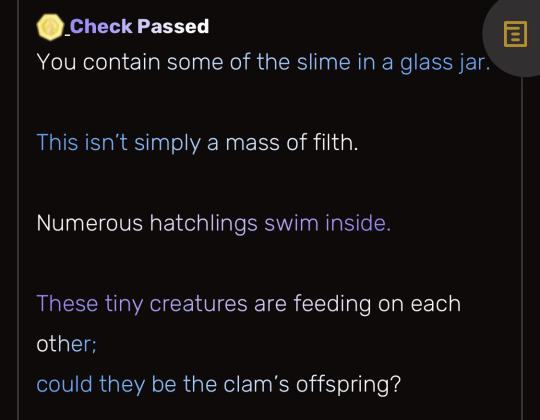
Sibling/family infighting is very Jia family. It reminds me a lot of this line base Hong Lu says.

You could take this a step further because the clam is something that would typically offer shelter from the rest of the world, and even though it protects, its offspring continue to kill and eat each other.
It seems fine, the offspring have this lovely shell for protection, and they have the precious pearl held within, but even as they are sheltered and wealthy. They are still getting killed and eaten by one another! Reminds me of someone I know:)
It reminds me of some bits in the later half of Red Chamber, where family members more obviously start acting behind each other’s backs or turning on each other, some even killing other family members.
Another part of the MD event that I got something out of was the beginning portion.
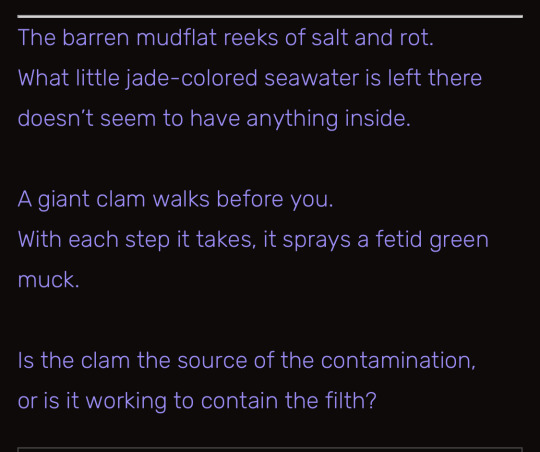
using specifically jade as the color for the seawater is a Hong Lu thing. I may be reaching with this bc it’s more than likely just flavor text BUT when taking this color with the fact that there’s nothing in the water it makes me think of an important scene in Red Chamber where Bao-Yu is described as an empty shell, so I wanted to mention it. We know Hong Lu has TONS of water motifs, especially when relating to his family (see his base ego)
The main reason I brought up this section of the MD event is because of the question brought up by the last portion.
If you take one thing from Dream Of The Red Chamber into your perception of Hong Lu as a character, it should be the themes of ambiguity, duality, and being between binaries. Because he sure as hell does that a lot!!! (and i’m not just talking about his gender) He is both genuinely curious and sheltered with an urge to learn as much as he can, but he also plays dumb frequently, backpedals and asks a lot of stupid questions on purpose to maintain others’ perceptions of him. He is CONSTANTLY walking the line between truth and illusion and it can be hard to tell which is which and precisely how much is fake or real, which is why I find him such an interesting character to think about.
Tangent about Hong Lu's characterization aside, it's really easy to read this line as about his family's perceptions of him.
Hong Lu (or rather, Bao-yu) can be read as being the source of the contamination in that he is the heir of the Jia family who is just an absolute fucking failure of everything you’d want in an heir for that time period.
The clam containing the filth can be read as Hong Lu’s lies (whether conscious lies or otherwise) to himself and others about the true “filth” of his family. Really good example of this is with another bit of window dialogue, but these lies and half truths come up quite a bit if you know where to look. (what happened to cohort of kin looking to stab each other in the back at every turn???)

We already have Hong Lu’s assorted water motifs (his feet make ripples on the water in his base id, land of illusion has so much water theming and shows the Jia mansion is surrounded by water) so I think this is a reasonable analysis to make :)
There’s some other sections to the MD event, but there’s nothing of note that triggered the Hong Lu sleeper agent in my brain & also this has gone on long enough that I wanna talk about predicting some stuff for the ego!
I am manifesting Gluttony/Gloom/Wrath for this ego!!
Gluttony and gloom are in the MD event’s skill check already and I think tie in nicely with the themes. Gluttony works with the offspring in the muck killing and eating each other and themes of greed with the pearl (plus the ego is primarily green and that’s a pretty good clue) and then gloom comes up a LOT with Hong Lu’s family (Liu Hong Lu, the only one that remarks on his jade eye, is also the only Hong Lu with gloom. land of illusion requires 5 gloom resources and also relates a lot to red chamber/his family) Gloom’s also generally a stand-in for water which exists here.
Wrath in Hong Lu generally manifests in him going “yeah, maybe my family was a little fucked up actually” internally, instead of manifesting as taking direct action about the fucked up things like it works for most other sinners, and acknowledging that his family was at least partially filth and killing and eating eachother (metaphorically. maybe literally) works for that
i am not an expert on sin analysis but i wanted to take a prediction bc it’s fun :)
I have a couple of predictions for corrosion and i’ll be real they are the main reason i wrote this thing because i LOVE when bad things happen to Hong Lu!!
Since this ego seems to be referencing Bao-yu so much i can pull stuff from Red Chamber too which makes it more fun :)
First one I came up with is Hong Lu taking the place of the pearl within the clam and getting locked in there! A bunch of his egos have to do with being controlled/trapped so i think it works and it also can work as a parallel for Bao-yu’s treatment by his family. Bao-yu’s name means precious jade, and he’s often treated more like his namesake than a person, heavily controlled and never allowed to leave the Jia mansion (or, in this case, the clam.) I just think it’d be fun!
My other concept has to do with more Red Chamber stuff, notably what happens when Bao-yu loses his jade. I’m not quite there yet in the text, but from what i’ve heard he becomes incredibly unstable and essentially loses his mind. This sets the Jia family’s downfall into even faster motion and from that point things get REALLY fucked up. Since the pearl here parallels Bao-yu’s jade, I think having a reference to that part of the book would be really fucking crazy for all 5 people who have read 1800+ pages of red chanber to get to chapter 94 where he loses that thing. Also i just want to see Hong Lu lose his mind i KNOW it would be terrifying and chilling. but they may be saving that for his distortion (manifesting)
In my skimming Red Chamber table of contents to find when Bao-yu loses his jade i just found a chapter where Bao-yu’s father admires a pearl but we will just ignore that for now bc this has taken long enough to type already and that is several chapters off. but there may be more analysis when this thing actually comes out!
Thank you for reading this far!! I hope you enjoyed me looking far too deep into an unreleased ego we know next to nothing about for fun! this took WAY longer than expected to type out but i’m glad I did because I loveee telling people about Hong Lu!
There is a very real chance very little of my analysis and prediction is reflected in canon BUT please remember that truth becomes fiction when the fiction’s true and even if this doesn’t turn out to be correct now u know a little more about Hong Lu and the themes he plays with :)
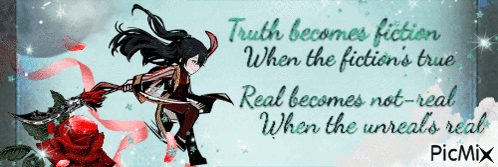
#limbus company#hong lu#hong lu lcb#limbus analysis#effervescent corrosion#analysis#limbus company analysis#my analysis#pachiposting#idk what tags people use!!! this deleted on me halfway thru and i type slow so weiting this was a miracle#i think i’m cooking here. i love analyzing#fighting for my life to upload the. ugly clam theory lore
209 notes
·
View notes
Text
Canto I: Abnos have a theme of "transformation," where they act in stages you need to disarm (heh) to fully get through (the Calendar's 'dormant' phase where you can only attack the Masked Dolls, Ebony Queen's vines you have to detangle, the Golden Apple's first phase before it unleashes its mass of maggots)
Canto II: Abnos are never fought directly, instead have a theme of enslavement/possession. What you fight instead are its 'minions' (Become Strong has the augmented robots, Pink Shoes has possessed corpses and robots, Baba Yaga has the frozen neighbors), only Pink Shoes is properly "neutralized"
Canto III: We technically never see a "straight" Abnormality, instead what are fought are human Inquisitors using EGO suits often Corroded. Kromer is a *weird* case as she is (probably) a human who behaves mechanically like an Abnormality (her lack of SP gauge and what *should* be either manifesting EGO or Distorting, while giving indication of neither)
Canto IV: Abnos all have a theme around tears/sadness/water; So That No One Will Cry is an obvious one just from its name; Brazen Bull who is always seeking water to relieve its suffering; Fairy Gentleman who offers you a glass of Fairy Wine; Shock Centipede, who is either given electric shocks or dropped in a tank of water; and Drifting Fox, the abandoned mutt caught in the rain, with only ragged umbrellas that can't keep it dry.
Canto V: Abnos have a theme around "miniboss sidequests," the main entity being surrounded by targets you have to kill first before you can properly fight the main target. Ambling Pearl has the Slime you have to attack so it can't 'eat' to boost its strength; Skin Prophet has its candles you have to light so that it can see you; Dream-Devouring Siltcurrent has the Flotsam you have to break both to breathe and to have it charge into.
Canto VI: There are no Abnormalities here this is just Heathcliff working out his childhood trauma and relationship problems.
#limbus company#*very* sloppy and incomplete analysis#also canto vi had 'stages' with a lot of its fights too so ~~~#I was trying to find a theme for them. i think it's water/liquid/tears#sinclair and heathcliff in the 'no abnos just childhood trauma and also my ex with yaoi hands' club
185 notes
·
View notes
Text
Let’s talk about Hong Lu’s poster
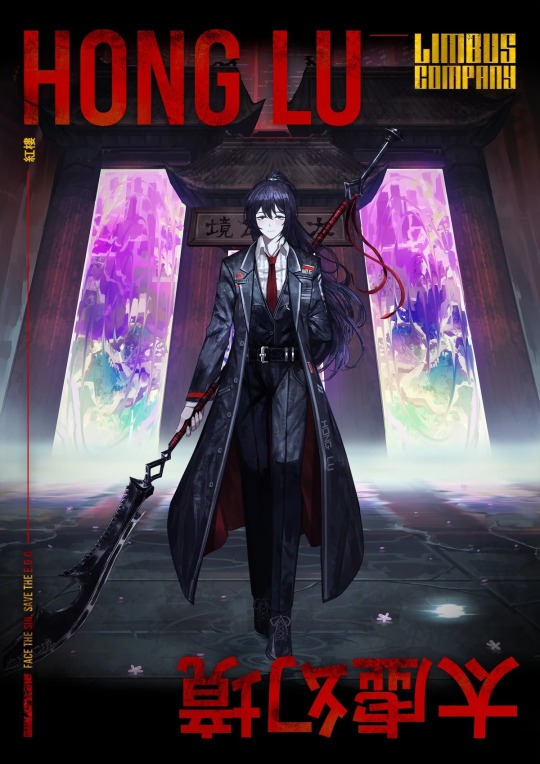
Summary:
Introduction
The paifang
Where is Hong Lu?
The reality of Hong Lu
{Skip the introduction if you’re only interested in the analysis of the character of Hong Lu and his poster}
I/ Introduction
Today I would like to offer you an analysis of Hong Lu's character poster. Although it is difficult to know what these character posters seek to show, apart from presenting characters, it is clear that each of them possesses clues about the sinners’ past and especially where the character represented comes from.
For example, we could see the pallid whale destroying the Pequod on Ishmael's poster, although it was easy to make the connection with Moby Dick, the poster also showed us that Ishmael had a history with a white whale and was a survivor of a shipwreck.
I am not sure if all the information is equally valuable according to the posters because, for example, Sinclair's poster is quite enigmatic and does not really show a specific event or place, or at least I do not recognize it.
But that does not stop me from believing that what is depicted behind the sinners is supposed to be related to the sinner, yes, but also, I think, related to a wing or place in the city that was important in the sinner's past.
I even wonder if the moment/place represented is not supposed to represent the place where the sinner decided to join the company.
Why do I say this? Well, you can see behind Rodion's character a casino setting, whereas her ego and space generated by the golden bough were affiliated with a world of ice. So why does Rodion's poster show her in front of an environment reminiscent of a casino? Perhaps it is to evoke her love for gambling as well as her ability to bluff and her desire for money, but if we look at Rodion's photo in the identity archive menu:

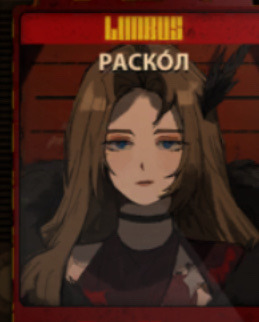
We can see Rodion in an outfit we have never seen her in before, an outfit that closely resembles what someone might wear at a casino. We have never seen how Rodion was recruited by Limbus Company, but if we follow the logic I just proposed, Rodion would have been recruited in a casino.
This logic seems credible and yet doubtful when we look at the case of Yi-sang.
For the moment, Yi-Sang is the only sinner whose recruitment by Limbus Company we know:
We know he was coming out of the laboratory where he was held by Gubo, the same laboratory we can see behind him on his poster.
But here's the catch: this is how Yi-sang was dressed when he met Faust VS versus what Yi-sang looks like on his photo in the identity archive:
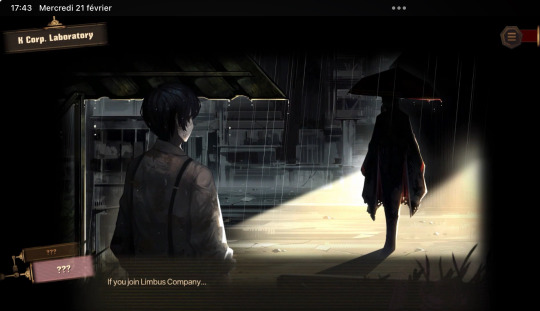
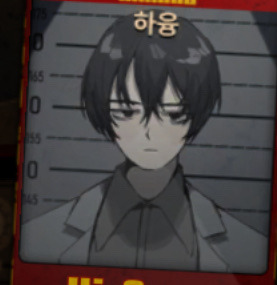
But hold on! I may have an explanation for this difference:
Yes, in the first image, Yi-Sang is not wearing his scientist coat, but he is indeed wearing the gray shirt, and I think Yi-Sang was indeed dressed with his coat initially, I think he just took it off in the left image.
So yes, it sounds like a lame excuse, but look at how Yi-Sang was dressed before this scene (when he was held captive).
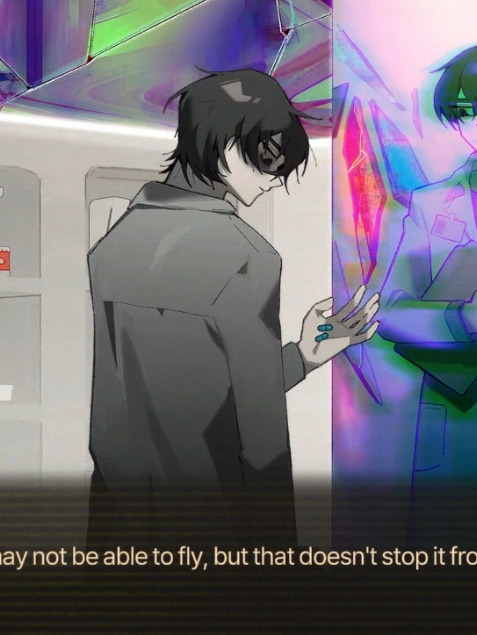
Boom, there it is, that scientist coat. Yi-Sang was indeed dressed as he was in that laboratory when his photo for the company was taken.
But here's the second little hiccup: we don't know how much time separates Yi-Sang's escape and his encounter with Faust...
But if what is depicted behind the sinners is not toward the place/moment where he was recruited by Limbus Company, then I think the place depicted behind the sinner is still a place/moment that shaped the sinner and convinced them to join Limbus Company.
II/ The Paifang
After this brief analysis that raised many questions, I would especially like us to keep the idea that what is depicted behind Hong Lu is related to him and the wing (or other place in the city) where he comes from.
Let's continue:
To make the understanding and analysis of the poster simpler, I decided to divide it into 6 zones:
Red: character
Dark blue: background area with tall buildings —> the city / what is behind the paifang
Purple: Paifang
Light blue: distorted and highly colorful area / portails
Orange: what surrounds the sides of the paifang
Green: the ground and what is in front of the paifang
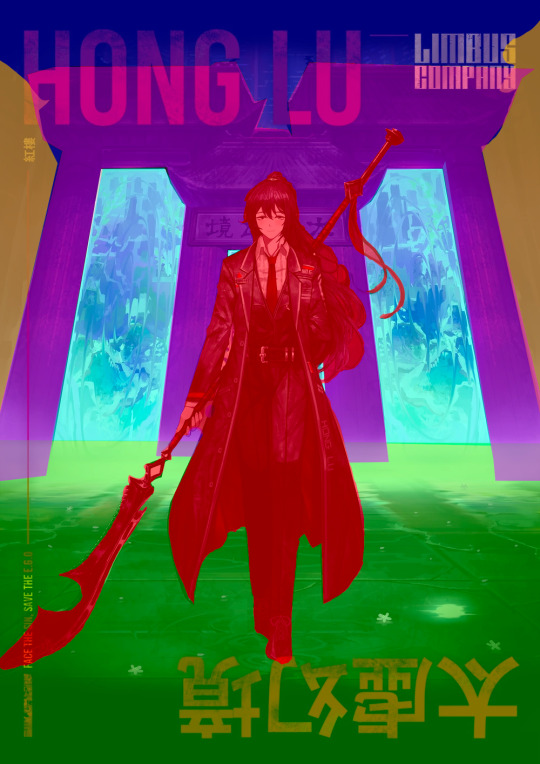
Even if sometimes I won't do it, I will now also use this color code to target specific areas of the poster when needed.
Well, first of all, I'm going to talk about the purple area, which is everything related to the Paifang, which is a very important element of this poster:
This Paifang, which looks like it's made of (red?) wood, seems to be surrounded by tall walls as we can see in the orange area.
So it seems that this Paifang is the only entrance and exit between two spaces. Indeed, if this Paifang is surrounded by walls and (assuming) they extend over a long distance, we can quickly conclude that this passage is the only one that could allow someone to enter or leave a closed space (we will come back to these ideas a little later).
Returning to the Paifang, it seems to perfectly fit the definition I found of a Paifang: "A Paifang is a traditional Chinese architectural structure in the form of a portico or arch, usually placed at the entrance of important places such as cities, temples, or properties. These symbolic gateways are often richly decorated and serve as monumental entry points."
I think the main idea to remember is that this Paifang is a gate/a means of passage, and I think it is the only gate allowing travel between the two spaces it separates.
But what does this gateway separate? Well, I think we have an answer with the inscription in the middle of this Paifang:

Indeed, what is written in the middle behind Hong Lu is this: 境幻虚太 (Jing Huan Xu Tai), we can recognize 4 distinct characters:
境: Realm
幻: Illusory
虚: Void
太: Great
But what is most surprising is that this phrase is actually written backward; indeed, in Chinese, it should be written 太虚幻境 (especially when we know what this combination means, especially in Dream of the Red Chamber), and here it is written as if it had been reflected in a mirror. We know that mirrors play a very important role in Limbus Company, but we will come back to this idea of a mirror a little later.
{Update : I was informed that the ordering of character written on the paifang is actually correct for traditional Chinese writing and for when the characters have to be placed horizontally (especially when you have to write on a space which does not really allow you to write in the vertical like on this paifan). The fact remains that the name of Hong Lu's weapon is therefore written in backward, so why? I don't really have an explanation now... and I have to admit that I still like my first analysis and I still think it is (a little) relevant in a way, so I invit you to keep reading (while keeping this in mind)}
For now, I would like to return to the meaning of what is written on this Paifang; indeed, once the combination of these 4 characters is reversed, it refers to a very important place in Dream of the Red Chamber: "Illusory Land of Great Void" or "Land of Illusion".
We can therefore conclude that this Paifang overlooks the "Land of Illusion" and separates/is the gateway between these two worlds, which are the "Land of Illusion" and, I think, the city.
Which is reminiscent of its “equivalent” in the novel since in the novel there is also a mention of a gate which separates the world of illusions from the rest or at least which indicates its entry point
{Side note: Strangely, this is not the only time that "太虚幻境" appears on the poster since it also appears just at the bottom right, and yes, "Land of Illusion" is also the name of Hong Lu's weapon, but that's not all! It is of course also the name of his EGO.
We can therefore see that the "Land of Illusion" is used to define many things related to or belonging to Hong Lu.}
In the novel Dream of the Red Chamber, The Land of Illusion is a domain where illusions and fantasies come to life. However, despite its enticing and enchanting appearance, this fictional world is also fraught with dangers and traps as it can lead individuals into deceptive illusions and prevent them from perceiving the truth.
However, a very interesting analysis of the Land of Illusion parallels this place with the Prospect Garden, which is the garden where Baoyu lives with his cousins and servants. It is the setting for many events in the novel and is also a haven of peace cut off from the rest of the world where its inhabitants can indulge in their idle and luxurious lives.
When Baoyu first visits this garden, he feels like he has been here before, and indeed, this garden actually reminds Baoyu of the place he visited in his dreams: the Land of Illusion.
A fantastical literary garden devoted to pleasure and love, which recalls the hero's dream of love and evokes in him a sense of the uncanny, will lead the reader to realize that Prospect Garden is the Land of Illusion. Eden, emptied of humanity, may remain a pristine ideal.
The Prospect Garden becomes a Buddhist allegory of experience. It blooms and withers with the ebb and flow of human desires and longings, but it is also a fictional world, imagined, the stuff of dreams.
The Prospect Garden is the earthly manifestation of the Land of Illusion, just as Baoyu is the physical earthly reincarnation of the stone.
III/ Where is Hong Lu?
After discussing what The Land of Illusion is and what this Paifang separated or rather where it leads to, it's time to ask a question: on which side is Hong Lu on his poster?
The Paifang already gives us an indication of this: since we can read "Land of Illusion" backward.
So I think we can deduce that Hong Lu is currently on the side of the "Land of Illusion" because if we follow the theory that the writing on the Paifang is reversed because Hong Lu is in a mirror world, then it's easy to guess that on the other side (the non-visible face) of the Paifang, we could read "The Land of Illusion" written correctly because this Paifang does lead to the "Land of Illusion."
To support this assertion (that Hong Lu is on the side of "The Land of Illusions"), I invite you to look at the dark blue area.
We can see tall buildings bathed in a red/black color; I think this modern aesthetic and these colors are supposed to remind us of the city, whose red color is often associated with —> just look at the map to notice this.
But that's not all: the color red is associated with the red dust by which Buddhism refers to the earthly realm, which contrasts sharply with the luxury brought to mind by the vernacular use of red.
Red dust is a symbol of the impermanence and transience of human life in Chinese philosophy.
It represents the reality of life as transient and ephemeral, reminding individuals that everything in this world is subject to change and disappearance. This notion is often used in Chinese literature and poetry to express the human condition and the importance of fully living each moment, knowing that nothing is permanent.
Red dust is used to talk about our world and our existence on it, which is but a short-lived illusion filled with suffering, to talk about the mundane world.
In Limbus Company, this world of Red Dust, this illusory world, is the city, and this bubbled paradise is "The Land of Illusion."
But how do we know that Hong Lu is indeed walking on the water of what I have been calling "The Land of Illusion" all this time?
Well, a clue might give us the answer; I invite you to look at the green area.
We can see that Hong Lu is walking on water, which already evokes the notion of "reflection" and this idea that The Land of Illusion is a mirrored world of the world of red dust, as is "The Land of Illusion" in the novel, but that's not all.
I will have to step away from Hong Lu's poster for a moment to look at an image present during the Limbus Company launch trailer.

Although nothing I'm about to say has been confirmed, I don't think it's too farfetched to say that we can see in this image a past version of Hong Lu, before he joined the company when he was at home, probably the Jia family manor (or at least its version of LCB).
What's interesting about this image is the color of the sky: this blue fading towards turquoise. We've seen it elsewhere before:

And yes! I am convinced that this blue space we can see in the cutscene of Hong Lu's EGO is supposed to be the sky from his home. And what is Hong Lu's EGO called? Land of Illusion.
Furthermore, I think that this blue sky is meant to contrast with the red sky of the city. Thus, the separation between the two is even more accentuated, as it was with the Paifang that clearly separated the two realities.
So, I believe that we can conclude that Hong Lu lives in the Land of Illusion.
This idea that the world in which Hong Lu lived is "The Land of Illusion" is emphasized by another detail: the reflection of the moon in the water.
In Buddhism, the image of the moon in the water is often used as a metaphor to illustrate the illusory nature of reality or the nature of conditioned existence. This metaphor is often associated with the practice of meditation and understanding the nature of the mind.
The moon in the water appears clearly and distinctly, but it is unstable and transitory, as it is subject to the movements of the water. Similarly, in daily life, what we perceive as reality is often changing, impermanent, and conditioned by multiple factors.
This metaphor thus emphasizes the importance of recognizing the illusory and impermanent nature of reality and not attaching to appearances or transient phenomena. In summary, in Buddhism, the image of the moon in the water is used to illustrate the illusory nature of reality and to encourage the practice of meditation and the search for the true nature of the mind.
I think that this image of the moon in the water is meant to make us understand the true nature of the place where Hong Lu walks: it is The Land Of Illusion, which is nevertheless Hong Lu's reality.
IV/ The Reality of Hong Lu
Indeed, I will now delve into an explanation, and I will try not to get confused. For this, we must now look at a very important excerpt when analyzing the novel Dream of the Red Chamber:
"Truth becomes fiction when the fiction's true; Real becomes not-real when the unreal's real."
This idiom is not just written anywhere in the world of the novel; it is located on the Paifang serving as the border and gateway to the Land of Illusion, and there is a good chance that it is also on the Paifang that we see behind Hong Lu.
This idiom makes us understand that reality is actually fiction and that fiction is actually the real world. It invites us to reverse our perception of realities and to consider what is called "real" as false and what is called “false” as real.
Here, I think, it is about understanding that Hong Lu's reality, which is (in) the Land of Illusions, is actually a fictitious and false world. Where the city, which is an unknown and completely foreign world to Hong Lu, which could be seen by him as a fictional world that is not real, is actually the real world, whereas the world he considers real is (his home) actually a false world.
To be honest, I cheated a bit because even though the reflection of the moon in the water is used to evoke a world of illusion for Buddhism, and even though I think it can indeed refer to the fact that Hong Lu is on the side of the "Land of Illusion", I think above all that this reflection is meant to make us understand that this world where Hong Lu is located has an illusory nature of reality + a nature of conditioned existence.
This brings me to talk again about Prospect Garden, which I think is the place where Hong Lu grew up but is especially the place from which Hong Lu must escape.
Prospect Garden is, as mentioned earlier, the Land of Illusion materialized in the real world and is therefore a domain where illusions and fantasies come to life, that is, a place where Baoyu bathed in luxury and idleness.
In "Dream of the Red Chamber," Jia Baoyu is often faced with symbolic choices between staying in Prospect Garden, which often represents the materialistic world and earthly pleasures, or setting out in search of spiritual enlightenment. His journey to enlightenment often involves leaving the illusions and distractions of the material world represented by Prospect Garden. Thus, it is often suggested that to achieve enlightenment, Jia Baoyu must move away from Prospect Garden and seek a true understanding of himself and the world around him.
At the end of the novel, Jia Baoyu (the figure who is supposed to have inspired Hong Lu) realizes the illusory nature of his life and realizes that Prospect Garden was only a world where he was trapped by the illusory pleasures of life, and that is why at the end Jia Baoyu decides to break with his previous life and leave the garden (as well as the rest of his family).
I think we are going to go to Hong Lu’s home to realise that he was literally living in a bubbled space and we will go to the Land of Illusion which, I think, will also be the Prospect Garden.
And the fact that the words are reverse like if they were reflected in a mirror helps, I think, to support on the idea that Hong Lu's world/reality is a reflection of the real world but where everything is distorted/inverted (a symbol I also think of Hong Lu's ignorance and his strange vision of the world) and that this illusion glass will break little by little
We also have to remember the sentence
"Truth becomes fiction when the fiction's true; Real becomes not-real when the unreal's real.
And remember that what is true is actually false / wrong according to this. So maybe, if this idea from the novel is kept, the world where Hong Lu is living is just a big lie where everything is just a smoke screen and that Hong Lu is living in denial, prefering to accept this illusion so that his world / vision of reality or truth is not shattered.
So, I think that Hong Lu, during his chapter, will have to understand that his reality is not true and learn to leave the land of illusion to find the truth because it seems to me that one of the theme of Hong Lu will turn around the theme of truth and reality.
#limbus company#hong lu lcb#project moon#analysis#theory#SN: I am so hype for Canto VI !!#so let's talk about Hong Lu while everyone else is talking about Heathcliff lol#of course it s just a theory and my interpretation#so I may be wrong or have misunderstood the character or even the book maybe#even if I really tried to do a maximum of research on the subject#Anyway I hope you'd enjoyed it !
85 notes
·
View notes
Text
With each new Hong Lu release I become more and more sure that one of the main themes of his character arc will be freedom. Especially with the utter fucking duality of his 000 Identities.
Tingtang Gangleader is Hong Lu with all the freedom in the world. He’s a leader of a Syndicate, he doesn’t have to follow any rules. However, he has no purpose, and so jumps at any opportunity to get a dopamine rush, whether that’s gambling or solving all of his problems with murder. He’s a Hong Lu driven to depravity by Too Much Freedom.
On the other hand.
K Corp Hong Lu has no freedom outside of the purpose given to him, all the way to effectively ceasing to exist if he has no purpose to fulfill. As such, he finds joy in what he does, no matter how horrible the acts he commits, because he quite literally has nothing else in his life. He’s a Hong Lu driven to depravity by the Utter Lack Of Freedom.
This all strikes the fear of Canto 8 in me.
#limbus company#limbus company project moon#hong lu#hong lu lcb#tingtang hong lu#k corp hong lu#lcb analysis#lu speaketh#i am terrified of k corp hong lu's uptie story#you know it's gonna fuck me up
371 notes
·
View notes
Text
reading through the main story again and man now i have some thoughts™ about Dante & their characterization
in canto 3 when they were talking to Vergilius near the beginning, he referred to pre-clock Dante as a “bigwig”. and when they were being attacked in the prologue, lion said something about not getting a second chance to kill someone of this caliber. so. it’s obvious they used to be someone important
they were probably mean!! an asshole!!! i wouldn’t be surprised, with what Faust said in canto 4 about wondering how they would react once they had their memories back, after they told the sinners to suppress the brazen bull
also these lines, when they were talking to Lion, Wolf, and Panther in the prologue:
“You dare… interrupt me just as I was engraving the ■■■■■■… You must be out of your…”
“Kngh… Just wait ‘til I get the ■■■■■■… You’ll be no match for my…”
makes them sound kind of full of themselves. VERY confident in whatever plan is being enacted here. they’re hot shit and they know it
this city is Fucked Up and i’m sure, regardless of what kind of position Dante had before, they had to climb over a few shoulders to get there
and then post-clock Dante. complete blank slate. they don’t know shit about fuck. the “nurture” of their personality has been wiped clean, free of the city’s influence, all that’s left is the “nature”, who Dante is at their core
and they’re NICE
at the end of canto 3, everyone is dead, Dante themselves is dying, and what they decide to do in what could’ve been their last moments is to comfort Sinclair, to tell him that even if everything that happened was his fault, he shouldn’t beat himself up about it
and then in canto 4 when the sinners are talking about how convenient the healing ampules are, they mention that Dante only heals them after they’ve died. “scared of a little hurting”, as Ryoshu put it. and then when Ishmael gets hit by that decay ampule they’re, understandably, worried about her. everyone standing around talking about how fucked up it all is and they’re the only one who really gives a shit about Ishmael melting to death
Outis is like “Ah, apologies for my negligence, Executive Manager. I failed to consider the suffering you must endure when you turn the clock” and then Dante is like. that’s not what i’m talking about. and the moment Ishmael shows fear they immediately rewind the clock to heal her even though no one’s died yet
anyway. all that to say—i love you, dante. i love you, choosing to be kind. i love you, inherent kindness of human beings
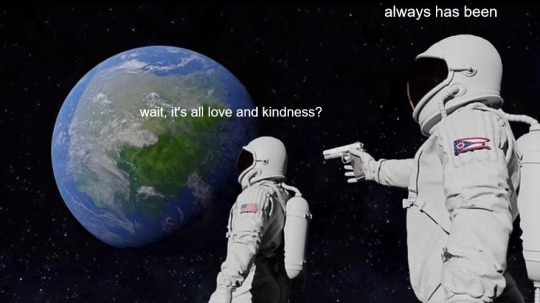
#limbus company#project moon#myth posts#posting this and then running away like a startled rabbit#i don't usually do character analysis or whatever and less often do i post it somewhere public 🙈
266 notes
·
View notes
Text
Canto IV was really good
Project Moon does a cool thing that I really like with their stories, which in theory isn't really anything special, but I see so few stories do this that it really does single Project Moon out in my mind.
Each Project Moon game is in a dialogue with itself, having a discussion about politics and philosophy and society in general. They universally present the status quo as Not Great which is... evident for anyone living in the real world, but importantly to me, they do not present any proper answers to this.
This isn't to say that Project Moon stories are fence sitting nonsense that call for the importance of meeting in the middle, that's your own decision on whether you think that's worthwhile. And Project Moon DOES express opinions in the world they have created, so they're not cowards in that sense either. It's pretty clear, at least to me, that they believe things in our world do have to change, that the vision of capitalism that exists in the City is horrendous, and that we in the real world are on a clear trajectory toward the world of the City if action is not taken.
However, the way they frame the two opposing sides of each argument they present is important. And key to that framing is that in every game you play antisocial, morally dubious murderers. This is a constant. The people you're fighting aren't the good guys, but hey, neither are you.
In Ruina, when it comes down to the final confrontation with the Reverberation Ensemble, you are presented with two opposing ideals. Carmen and the Ensemble would love nothing more than to see the world torn down in its entirety, built back up in their own imagining of an ideal society. The Librarians, on the other hand, are there to fight against that notion, that the world they have as it is can be changed.
And while I definitely fall on the side of "maybe there's hope to be had in this dying, hellish apocalypse" I do GET where the Ensemble is coming from. I GET what Carmen's trying to do. It's a naive and childish attempt at creating a better world from the ashes of the old, an idea whose inevitable result is tyranny, but to someone who's already experiencing tyranny, tyranny but this time you're on top seems appealing. And I also understand that, for the Librarians, even if the ultimate goal here is to create a better society without that sort of tyranny, well you're kind of murdering people to achieve that.
And I think all this plays into why I enjoyed Canto IV so much. First off, the main conflict in Canto IV isn't between Limbus Company and another group, it's the conflict between K Corp and the Technology Liberation Alliance, which can be further distilled down to the conflict between Dongrang and Dongbaek.
In the case of K Corp, they're a bunch of utilitarians, people who say that even torture is acceptable if it leads to lives saved. And they quite literally do this, torturing the Tearful Thing in literally every possible way, just to produce the tears needed for regeneration ampules, forcing it to cry for the sake of others. Dongbaek doesn't even fully refute that this might be useful, but she does assert that if you're going to go to these lengths, there better be a foreseeable end to it, you better be curing EVERYONE.
And then we have the TLA, a bunch of anprims who aren't exactly wrong in the assertion that the way technology is used within the City causes immeasurable harm, but do come to the wrong conclusion that ALL tech needs to be incinerated. And, for them to come against K Corp specifically is significant, because sure, K Corp literally tortures people to produce their ampules, but the results are tangible. Lives are, in fact, saved, even if we discount the K Corp Security that will cut their own limbs off just to get healed.
And where Canto IV manages to stop saying "both sides bad" is in bringing Limbus Company back into the equation. A third party, who doesn't adhere to the ideals of either side.
Does Limbus Company have perfect answers to resolve this conflict? No, you're still a bunch of murderers. But they do present a third perspective, that instead of looking only at total harm done and coming to the conclusion that torture is acceptable, and instead of looking at all the injustices caused and coming to the conclusion that the entire world needs to be reset, through exploring the fathoms of Yi Sang's EGO, we can come to consider the possibility of caring for the individual. That yes, this world is fucked up and living in it can itself be considered a crime against humanity, but that doesn't mean you can't help someone in a way that doesn't hurt someone else. Yi Sang went from being horribly depressed with nothing in this world, someone who desperately wanted to die and couldn't even be afforded that mercy, to someone who finally smiled. The world is still fucked up, and we don't really have a solution to that, but we at least made it a little bit brighter for one person, and in the future, we can keep doing that.
And also? Canto IV introduced Alfonso so really it's just the best chapter.
#project moon#lobotomy corporation#library of ruina#limbus company#spoilers#Limbus Canto IV#i know i massively simplified both Ruina and Canto IV but I'm writing a tumblr post not my PhD thesis#go play Project Moon games there's a lot more nuance to them than what I've presented here#this isn't even a comprehensive analysis of why I enjoyed Canto IV this is just one specific aspect of it that I liked#im puppy
267 notes
·
View notes
Text
Limbus Faust Theory Time
Ok, so I've been thinking about this for a while. Ever since someone on Limbus' TvTropes page pointed out some Faust (Book) symbolism in Faust's base ego I've had this big fucking theory about Faust that I already know can't be confirmed until her Canto. And considering that (By the current order) that's gonna take like 2 years, I'm just gonna say it now.
Faust is actually a clone of the original Faust.
My evidence
Faust's symbol is a Flask. Now while Play!Faust (and the actual guy he was partially based on) was an alchemist, a flask specifically is a symbol of one character in the whole book/play; the Homunculus. The Homunculus is born as a small flame inside of a glass flask (And yes this is what Father from FMA's initial form was based on), created by Faust's (pre-deal with the devil) assistant Wagner who wishes to see the world. To this end, the Homunculus accompanies Faust and Mephistopheles to a Walpurgis Night (Sound familiar?) where they discover the wonders of nature. At the end of their segment, they shatter their flask and become one with the ocean.
It's weird that Project Moon would give Faust, based on a character who's literally the namesake for the term Faustian bargain, a symbol based on the flask instead of say, a demon. Not to mention Faust's sword saying Walpurgisnacht and her association with the in-game event. Unless of course, Faust isn't supposed to represent Faust himself, but rather the Homunculus. And that word almost universally regarded as a term for an artificial approximation of a human.
Every base EGO (Other than Rodion and Mersault for whatever reason) has a shadow across it that correlates to their respective Sinner's backstory in some way. Of the ones we have so far; Yi Sang's is a wing (Representing the wings he saw on his other self in the mirror and his status as a wing asset), Ishmael's is an anchor (Her previous status as a sailor and metaphorically her weighing herself to getting revenge on Ahab), Gregor's is a bunch of grasping hands (His experiences during the Smoke war), and Sinclair's is a tree with a snake going around it (Representing the temptation Kromer gave him that he gave into, which resulted in his family being slaughtered by her).
Faust's base EGO has the shadow of three separate people standing around her. Going off the original story, these would correlate to Faust, Wagner, and Mephistopheles standing around the Homunculus' flask. This is the specific bit pointed out by TvTropes that gave birth to this whole theory.
The abnormality EGO each character gets also tends to relate to them in some way, on a similar level to how each EGO used in a realization in Library of Ruina represented certain experiences. For example, as of the time of this writing Ishmael has Roseate Desire, Blind Obsession (Both relating to obsession and refusal to let go), Capote (Blind rage), and Ardor Blossom Star (Guidance or the lack thereof without a goal).
Faust's current EGO as of this writing include 9:2 (Forbidden knowledge), Telepole (experimentation), Hexnail (Abandonment), and Fluid Sack (Lack of direction), which in my opinion fits more with a creation trying to find their purpose in life after being free of their creator than someone willing to sell their soul for infinite knowledge.
It's mentioned that Faust rarely sleeps, and she rarely seems to be as affected by things like motion sickness or exhaustion as the other Sinners, which points towards her having some kind of inherent enhancement in some way.
The backstory of the homunculus matches with a shared desire among a lot of the other Sinners who we do know the backstory of; namely the idea of exploring the world and finding people you can truly call companions along the way.
Now, why do I think Faust is specifically a clone of the original and not say, a lab-created experiment? Well:
When we see Yi Sang's flashback to him agreeing to join the Company, we see him being recruited by someone who has to be Faust. She has the same voice actor and character name color... except we also never see her face, and the figure notably isn't identified as Faust and is instead credited as ???. Not only does the game usually explicitly identify a character as long as they've been properly introduced, but even the "But Yi Sang didn't know who it was at the time" doesn't work considering he's remembering and knows who Faust is now.
Faust is Sinner #2 instead of Sinner #1. While we can't be certain that Sinner numbers are based on recruitment order (Though there does seem to be some precedence in that Heathcliff seems to have been around when Ishmael was recruited, and he's #7 to her #8, and #10 Dante may have been recruited in their original self before Sinclair, Outis, and Gregor and simply never introduced to the group) it's odd that someone who otherwise acts as the head of the company (Recruiting Vergilius and Yi Sang, making the bus, etc.) would only be #2. In fact it's odd for that person to be in the field in the first place.
We know cloning is possible in the City, enough so that the Head outright has a law governing it. Namely, that only one copy of a person can exist within the City after week's time period. Note how that's worded. Only one copy of a person can exist within the City after a week's time period.
Conveniently, we now know the inner workings of the bus just so happen to have a portal that leads to different parts of the Outskirts.
Faust has a habit of referring to herself in third person, but she's a bit inconsistent about it. In fact, a lot of the time it happens when she's boasting of knowledge specifically. But maybe she's not saying things in third person. Maybe she's intentionally saying "Faust is a well-renowned genius" instead of "I am a well-renowned genius".
Faust being a clone would also fit with who actually runs the company itself. It doesn't seem to be the Purple Tear (The three who attack Dante in the prologue seem to be her agents) and Faust is the one who seems to give everyone instructions, including both Dante and Vergilius, yet there has to be someone coordinating all the other aspects of the company like arranging travel and the Before and After teams. But maybe it is Faust doing everything. Just not the same Faust we're interacting with.
To sum it up, I think Faust is the one running the company, but not the same Faust who's part of the Sinners. I think she made a clone of herself, imparting all her knowledge into it before going to the Outskirts to run the company from there (Just like how Ayin and Carmen had their original facility there), leaving the clone to fulfill its own desire to see the world and also take the risk involved with becoming a Sinner in her place. The reason Vergilius gives so much respect to Faust? Because she's a proxy of the original, the original who recruited him and the other Sinners in the first place. The various shady shit Faust does? All on orders from the original. Faust's constant boasting of her own knowledge in third person? She's trying to convince herself that she's as good as the original Faust instead of just a copy.
If anyone has any evidence they can think of, feel free to reblog with it.
103 notes
·
View notes
Text
About Dante and Ishmael...
I genuinely love how Dante and Ishmael seem to be on the same wave length, and they value her opinion alot, as compared to the other sinners. Honestly, I feel like Ishmael and Gregor are the closest to Dante on the bus, with Ishmael been given alot of moments to show how much they trust her judgement and words.
Like back in Canto 2, when they lost the luck to the slot machine with Don, Ishmael's scathing remark had hurt Dante the most. No one else has come close to criticizing Dante so directly ever since (except if you count the insult in the mirror dungeon).
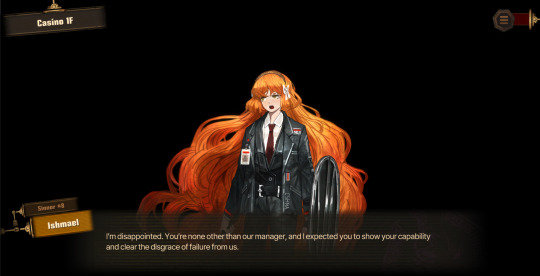



But then in Canto 3 when Dante spoke about mounting their clockhead on a wall after every thing was over(and questions about what exactly Dante was/is and if they're considered a person were brought up) or when Guido asked Dante to step forward as a sacrifice to let the sinners go, Ishmael stepped up to chastise them and show disappointment at the suggestion of Dante being anything less than a person. Even Heathcliff went directly into wanting to deal with Guido but Ishmael turned to Dante first and formost.


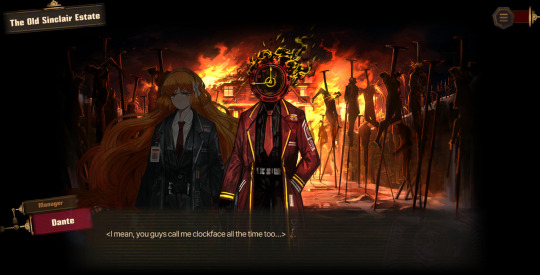

Then in Canto 4, Dante agreeing with Ishmael to fight against the drones to save civilians (also smth similar in Canto 3 where Outis wanted to keep charging ahead but Dante heeded Ish's suggestion to fall back) and more notably Ishmael being faster than Outis in going to protect Dante and then them restoring Ishmael even before they could die (unlike what they usually do due to the pain that they endure with raising the Sinners)

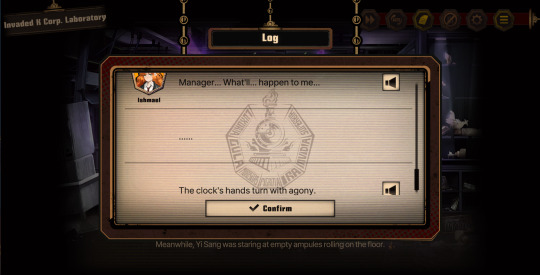
All in all, with Canto 5 and Ishmael being in the spotlight, I wonder how much her trust is going to be tested, how will Dante react to honestly one of the most trusting, straightforward Sinner they know questioning them and their actions more than everyone else. Will Dante's answers and judgement be satisfactory to her, and how will Ishmael be by the end of her Canto? Will she be similar to Yi Sang and open up more, accept that she can't completely ever move on from their past and live while throwing it on the back burner of her mind, or will she revert to smth alot more quiet and reserved (not a complete change in personality, just not the same anymore).
Lots of thoughts about Ishmael and Dante's companionship (I won't say friendship but they're close, kinda like Dante and Meursault. It's that trust that runs deep without knowing too much about one another or being too friendly)
#Ishmael lcb#lcb analysis#dante limbus company#lcb#canto v#limbus company#Dante and Ishmael best coworkers tbh#Ishmael better get promoted once Dante gets their head back#Ish becomes Dante's right hand man alongside Faust Yi Sang and Gregor (seperated for regular and clock hands)
290 notes
·
View notes
Text

94 notes
·
View notes
Text
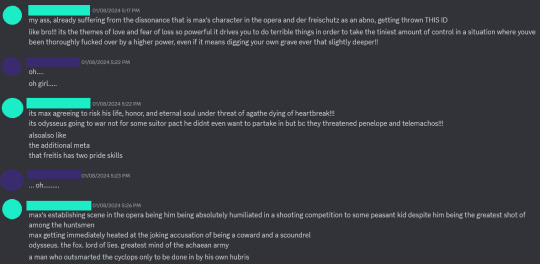
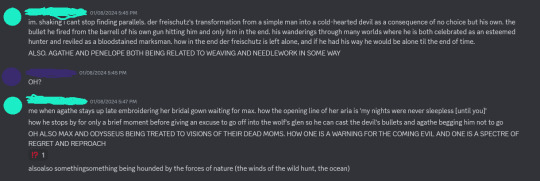


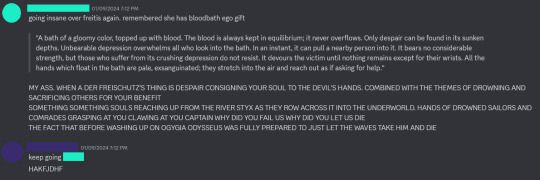

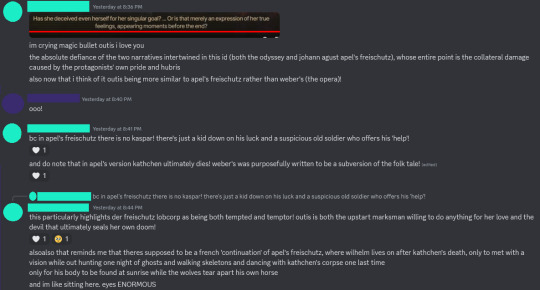
some thoughts i had over discord over the past few days
when you're a long-time odyssey enjoyer and walpurgisnacht 2 drops one month after incidentally getting into weber's opera bc of der freischütz lobcorp
#original post#fandom#limbus company#lobotomy corporation#lobotomy corporation spoilers#bc a/c is briefly discussed here#outis lcb#der freischütz#character analysis#carrying her with the back of her jacket's really tall collar in my mouth like a cat#also uh. apologies for any inaccuracies classics people‚ opera people‚ and folklore people pls feel free to correct me if im wrong#me when der freischütz lobcorp is meant to be both max AND the black huntsman
48 notes
·
View notes
Text
Thinking about the three characters we've met who had already found and claimed the Golden Bough before the Sinners, Kromer, Dongbaek and now Ahab it's very interesting to me that they all have in common being women leaders of groups where they are seen as messiahs of sorts, much like how Carmen herself who is the origin of The Light was the one who united the original LobCorp team and had such supernatural charisma that she could convince anyone she wanted to join her cause of "saving humanity".
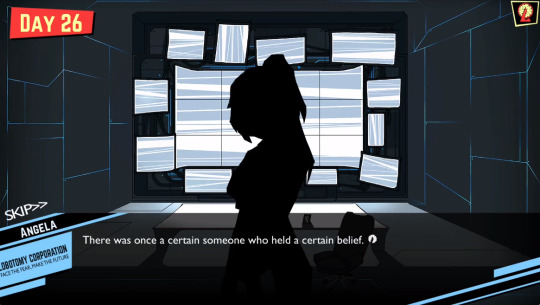

Kromer is the most blantant and cartoonish example, she's worshipped as a messiah and goddess by her followers to the point they consider basking in her grace a priviledge to the point of genuine insanity beyond what any regular person could comprehend, pure religious fanatism for their savior they believe in who will bring them a "pure, untainted" world, so much that they have cast away their individuality in their adoration, inquisitors being indistinguishable from one another.
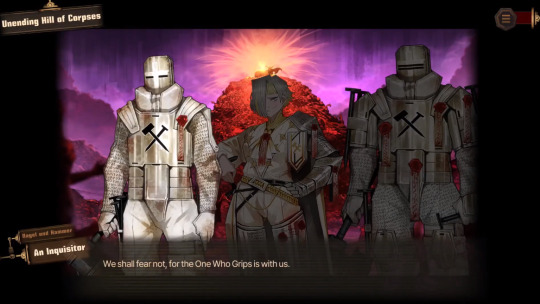
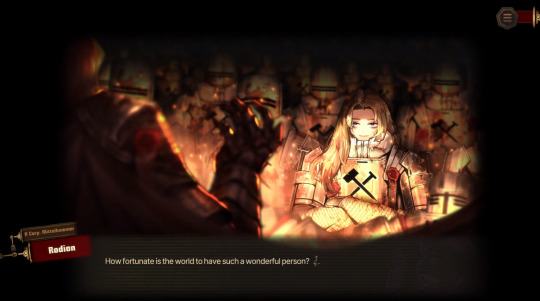
Ahab who is a more realistic example of this kind of person even if not as infallible as the seemingly perfect Carmen; she's strong, confident, passionate, revered as a hero and makes convincing cases for herself while having the unnatural ability to appeal to people's desires and cut through them, and in her case the way the Pequod Town have come to bend to her isn't unfounded given their situation. I think that's what makes her significantly scarier and more effective as a villain and character in general; she's not just a comically evil woman in a position of power, you can very easily see why some people would fall for her words and bend to her will. She is paradoxically both the savior of the Pequod and the one who doomed them to the hell inside The Pallid Whale, yet after being isolated from society for so long with no other choices or escape and having their sense of self degraded by the Pallidfication the Pequod crew only came to see the first part.
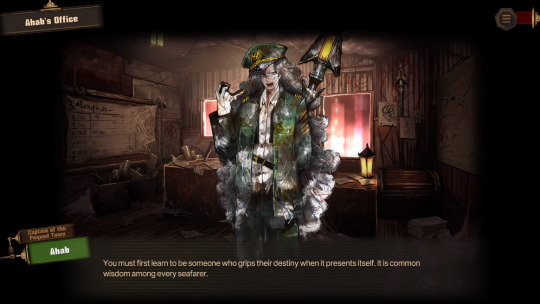
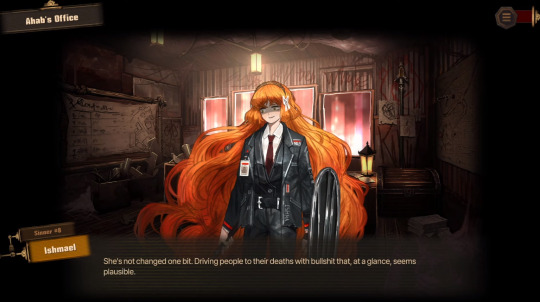
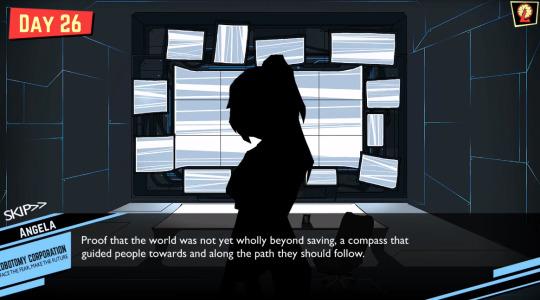
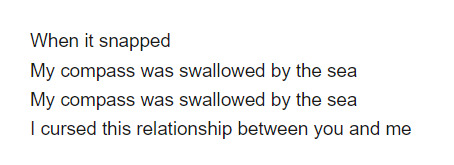
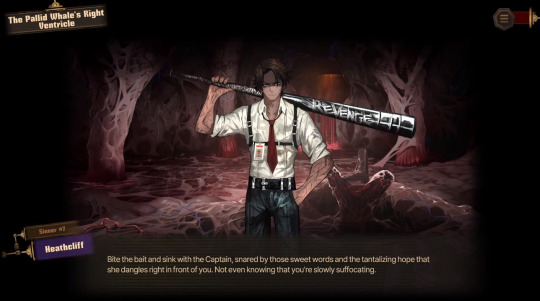
Dongbaek is an interesting case, unlike the two women described before who are undeniably villains and egomaniacal, she's portrayed as much more sympathetic and even an outright tragic figure, however at the same time unlike them we never directly see the relationship she has with her followers. They never talk about Dongbaek herself and not even mention her in any way, only the ideology she gave them: destroy the current order to create an ideal world free from the shackles of The Wings and technological advancement, and unlike the two before who are always aided by their lackeys, Dongbaek was always seen alone, less like a hero or a goddess but more like a ghost that haunted everyone, much like Carmen's role in LobCorp. This "ghost" motif is doubly emphasized by her sickly dying appearance and how she contantly dissapeared and appeared without a trace, never letting those around her forget about all they have lost or sacrificed trapped in her vendetta.
But ultimately Dongrang, herself and even Yi Sang come to admit her motives were just as self-centered and she was just as manipulative, yet rather from a place of hubris it came from a place of deep despair and yearning.
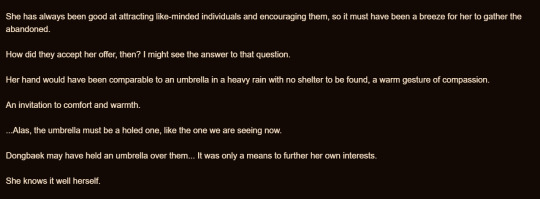
Like Kromer, the TLA believed she would make a better world, but like Ahab, she was ultimately someone taking advantage of people in despair and giving them false hopes, all while deluding herself further, and much like Carmen, she's associated with trees and vegetation, both expressing the wish to be like one and having a disdain for The Wings, though in Dongbaek's case, she only represents half of Carmen's wish; being the plant blooming across the land, while Yi Sang is the one who would reach the sky.
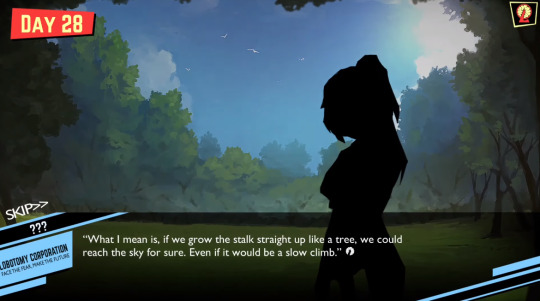
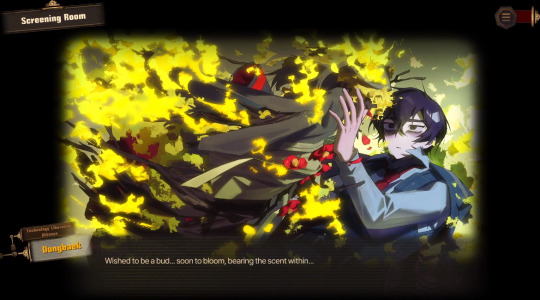
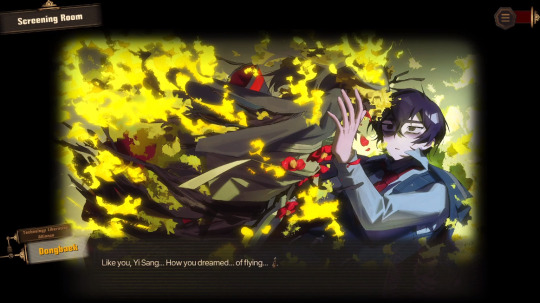
In the end, all three of these women were false saviors, much like how Carmen's idea of bringing salvation to humanity led to all of the suffering within Lobotomy Corporation, the unleashing of chaos upon The City even her own endless torture as The Well giving birth to Abnormalities...it makes me wonder if all of this was intentional, as a way to parallel Carmen herself. Yet all three of them appear to us clearly untrustworthy while Carmen does not.
Kromer, Dongbaek and Ahab are immediately stablished as dangerous presences; Ahab and Kromer being the sources of Ishmael and Sinclair's suffering and tormenters they have to overcome --the source of their nightmares, and Dongbaek is introduced stabbing Yi Sang and being called "dangerous" yet Carmen is introduced as her best self and all the best memories everyone has of her, it isn't until Ruina, away from Ayin's perspective that she's questioned, it makes me wonder if they will continue to bring these characters contrasting Carmen in further chapters.
#project moon#limbus company#Canto V spoilers#Lobotomy Corporation#Carmen LobCorp#lcb Kromer#lcb Dongbaek#lcb Ahab#analysis#Limbus Company analysis#I should properly tag these now#idk I'm having a lot of thoughts
239 notes
·
View notes
Text
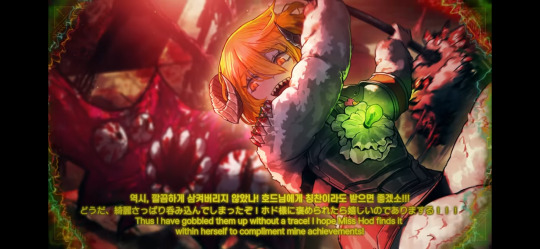

hey don, nice void dream ego gift you got there
update!! she has fragment of the universe’s too! (little hearts next to the meat lantern lure on her chest)
i also found out the new outis id has bloodbath’s ego gift which is. concerning for several reasons
#limbus company#sure i’ll main tag that. i think it makes sense for her#w the whole impossible dream thing#this could be a mostly nothing addition but i really like void dream so i WILL look into it#to me it’s a Hong Lu abnormality but it is also VERY much a don abno and we know.#VERY little about don. it’s kinda fucked up#but yea she’s got sheep horns from void dream and meat lantern pointy teeth#assigned caretaker of kinda lumpy white things ig#i haven’t looked too into meat lantern but that’s also rly don quixote. i loveee chatactwr analysis thru shit like this#pachiposting
63 notes
·
View notes
Text
One thing I've been thinking about lately:
I don't think I've seen a single post about how queer-coded Demian (the silly Sinclair book) was — I mean yes it was weird and sometimes it felt like Sinclair was trying to get together with Demian's mom, Eva, but also the relationship between Sinclair and Demian is pretty intense too.
(Kept my comments because they're too stupid to leave out)

The only reason I could come up with for why this might be written like this is the war segment at the end — a lot of war is pretty gay on its own and an unfiltered straight view on the matter will still come across as pretty queer. However, other, non-war sections are equally gay. Herman, you got something you trying to tell us?

Anyways. This just made me curious about the future of Demian as a character in Limbus and I'm super interested where they'll take it. My interpretation is that Dante's clock hands only move when a character has one complete character arc, so that means Sinclair's is still incomplete. How'll the wrap that shit up? Let this religious trauma baby be happy pretty please 🥺🥺🥺
#limbus company#hermann hesse#demian#literary analysis#sinclair lcb#project moon#yep im definitely just superimposing my queer headcanons onto a straight narrative aren't I#i still don't know how to tag
25 notes
·
View notes
Text
Summary of all mentions of members of Hong Lu's family in the game + comparison with the original book
Summary:
Mention of his “family” in general in the game
Mention of the family elders in the game + comparison with the original work
Mention of his grandmother in the game + comparison with the original work
Mention of his grandfather in the game + comparison with the original work
Mention of his father in the game + comparison with the original work
Mention of his siblings in the game + comparison with the original work
Mention of his brother (Jia Huan) in the game
I wanted to recap all the times Hong Lu talks about his family or a particular member of his family while at the same time comparing them to their version of the original novel by giving some info on the latter (assuming that Hong Lu = Jia Baoyu ). I excluded from this list the uncles and aunts by marriage as well as Baoyu's cousins for various reasons (too long otherwise, not mentioned...) but I will perhaps do a part 2 to talk about them.
Was also excluded, the entire branch which stems from Jia Yan (the brother of Jia Yuan (the father of Jia Daishan, the husband of Grandmother Jia)), a branch which remains important since it is this one who leads to the actual Head of the Ningguo Mansion (Jia Zhen) when the story takes place. But since, they are distant relatives/cousins of Jia Baoyu, that was taking me too far and so I had to remove them from this list. But I still wanted to mention it since it is an important branch of the family
The Jia family is mainly composed of 4 great families: the Jia Family, the Xue Family, the Wang Family and the Shi family in other words those who were born with the name Jia and those who joined the family by marriage / alliance / by being the brother / sister of one of the grooms… (born Xue or Wang or Shi).
There are also other families like the Xing or Lin family joining the Jia family but whose name appears (very) less often and which are also not considered as one of the great families of the novel.
This list of family members is made in relation to the place they occupy in relation to Jia Baoyu.
I/Mention of his “family” in general in the game
LCB sinner, chatter#3
Abn. logs, Pink shoes: lacking data
Abn. Logs, Sign of Roses: level 1
Abn. Logs, Sign of Roses: level 3
Liu Association South Section 5, story
Liu Association South Section 5, story
K Corp. Class 3 excision staff, post-uptie chat 2
W Corp. L2 Cleanup agent, Idle
Main story, Canto II, episode: 3
Detour Tales, Chapter 5.5, Miracle in district 20, episode: 13
Main story, Canto V, episode: 2
Hong Lu’s promo pre-limbus company release (Hong Lu also mentions the family’s chef’s side dishes but I didn’t include it because it was not about his family specifically)
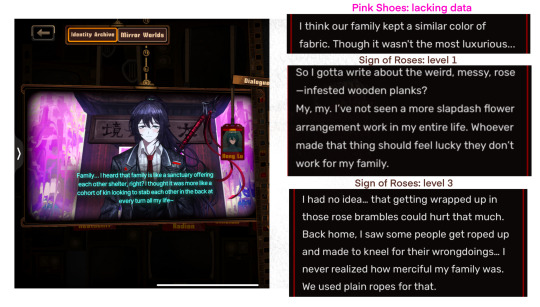
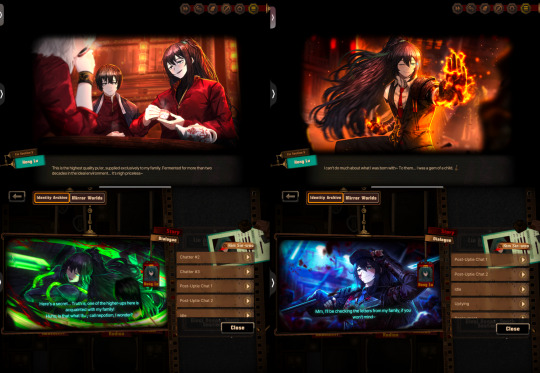
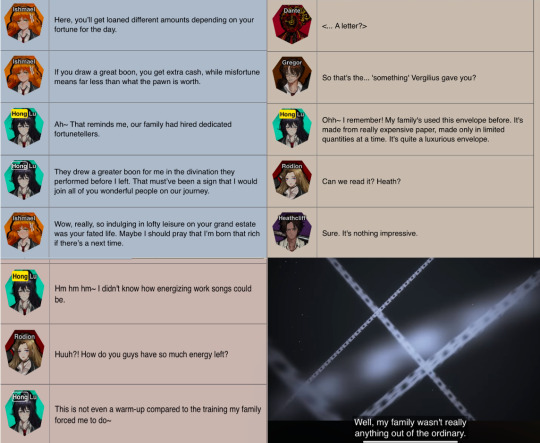
II/Mention of the family elders in the game + comparison with the original work
W Corp. L2 Cleanup agent, story
W Corp. L2 Cleanup agent, story
Main story, Canto IV, episode: 27
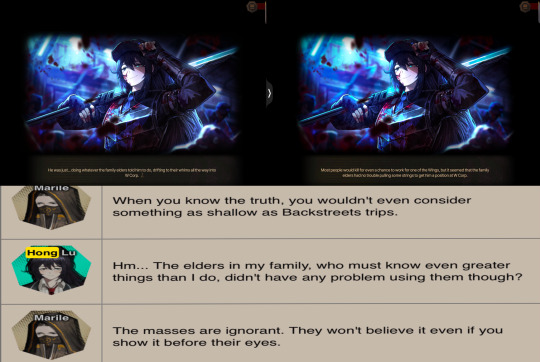
To tell the truth, I don't really know what the term "elders" is supposed to encompass in this context in the sense that, I don't know whether or not parents and/or uncles/aunts should be included in addition to the grandparents.
In my opinion the term "elders" refers to all the generations who are above the one who uses this term (in this case Hong Lu / Jia Baoyu) so I would tend to want to count the parents and uncles / aunts but I cannot say this with certainty.
I will therefore base myself on my interpretation so that it will allow me to talk about more characters of the novel but do not hesitate to let me know what this term encompasses!
1st generation:
Grand parents:
Jia Daishan:
Son of Jia Yuan
first Duke of Rong
husband of Grandmother Jia
father of Jia She, Jia Min and Jia Zheng
grandfather of the three first Spring Ladies (Jia Yuanchun, Jia Tanchun and Jia Yingchun), Jia Zhu, Baoyu, Daiyu, Jia Huan, Jia Lian
died before the beginning of the novel, reason why we don’t know much about him
Grandma Jia (the Dowager):
Daughter of the Marquis Shi of Jinling
Wife of Jia Daishan
Grandmother Jia is a generation above the oldest member of the Rongguo Mansion (Jia Jing)
Thus, members of the Jia family all defer to her
For further information, refer to the paragraph dedicated to her below
Great uncle(s):
Dowager’s brother:
We don't know much about the Dowager's brother
He is Grandmother Jia’s brother
He is the father of Shi Ding and Shi Xiangyun's Father
He is Shi Xiangyun’s grandfather
died before the beginning of the novel, reason why we don’t know much about him
2nd generation:
Parents:
Jia Zheng:
Jia Zheng is the second and youngest son of Jia Daishan and Grandmother Jia.
He has a wife, Lady Wang, and two concubines: Zhao (with whom he had two children) and Zhou
For further information, refer to the paragraph dedicated to him below
Lady Wang:
Daughter of one of the four most prominent families of Jinling (Wang)
Primary wife of Jia Zheng
Mother of Baoyu and Yuanchun
Because of her purported ill-health, she hands over the running of the household to her niece, Wang Xifeng
In the eyes of her servants, she appears as a statue of a lifeless Buddha.
Although generous, she is described as without will or conviction.
Lady Wang seems kind and caring but can be cruel and ruthless when her authority is questioned.
She shows excessive concern about her son Baoyu's romantic relationships and closely monitors his maids.
Lady Wang plays a role in the death of Baoyu's maid, Qingwen, due to her suspicion and cruelty toward maids she perceives as threats to her son's virtue.
Uncles:
Jia She:
Elder son of the Dowager
Big brother of Jia Zheng and Jia Min
Husband of Xing furen
He has 2 concubines: Yingchun’s mother and Jia Cong's mother
Father of Jia Lian, Jia Yingchun and Jia Cong
He inherited the title of Marquis Rong
He is treacherous and greedy, as well as seductive/woomanizer.
He feels jealous towards his younger brother, favored by their mother.
He was later stripped of his title and banished by the government.
Father of Wang Ren and Wang Xifeng:
Lady Wang’s brother
Also brother of Wang Ziteng and Wang Zisheng
Father of Wang Ren and Wang Xifeng:
Wang Ziteng:
Lady Wang’s brother
Also brother of Wang Xifeng’s father and Wang Zisheng
Wang Zisheng:
Lady Wang’s brother
Also brother of Wang Xifeng’s father and Wang Ziteng
Aunts:
Jia Min:
Daughter of Jia Daishan and Grandmother Jia
Sister of Jia She and Jia Zheng
Wife of Lin Ruhai
Mother of Lin Daiyu
Xue Yima also known as Aunt Xue:
Sister of Lady Wang
Sister of Wang Ziteng, Wang Zisheng and Wang Xifeng’s father
Mother to Xue Pan and Xue Baochai
She is generally kind and affable.
However, she struggles to control her rambunctious son.
III/ Mention of his grandmother in the game + comparison with the original work
K Corp. Class 3 excision staff, story
K Corp. Class 3 excision staff, story
K Corp. Class 3 excision staff, story
K Corp. Class 3 excision staff, story
W Corp. L2 Cleanup agent, chatter #1
K Corp. Class 3 excision staff, post-uptie chat 1
Detour Tales, Chapter 5.5, S.E.A, episode: 4
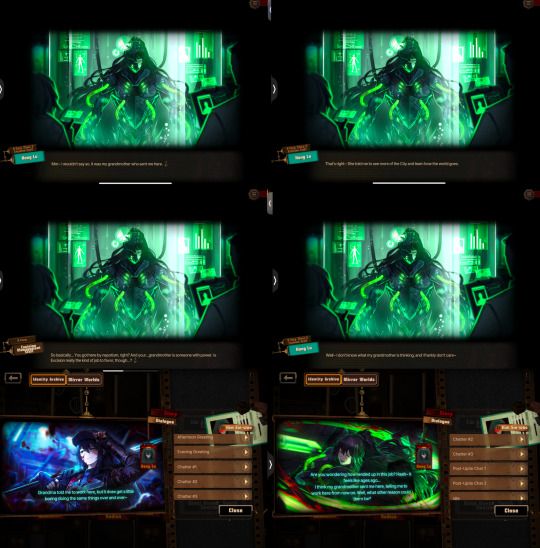
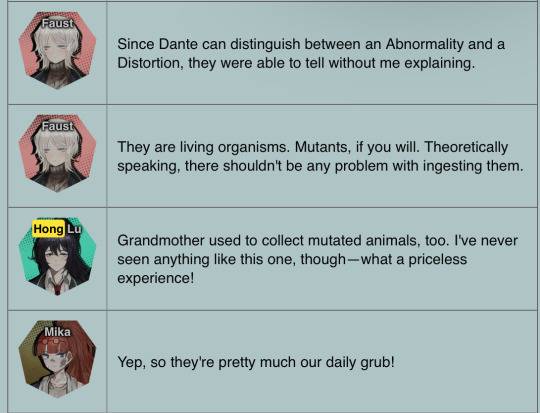
If Hong Lu is indeed the equivalent of Jia Baoyu in the world of limbus company, Hong Lu's grandmother should be the one known as Grandmother Jia, née Shi:
Grandmother Jia:
Also called Dowager Shi or simply the Dowager
She is the daughter of the Marquis Shi of Jinling
Grandmother Jia is a generation above the oldest member of the Rongguo Mansion (Jia Jing)
Main elder of the great family, she is the oldest and most respected authority of the Jia Clan
Of an enjoyable temperament, she does not intervene in the private lives of her children provided that they do not disturb her, even if they have become debauched or high rollers.
It was she who arranged for Daiyu, her only "outside" (i.e., maternal) grandchild, to come to the Rongguo Mansion
She spoils her grandson Baoyu whom she carries in adoration
Despite this, she does not approve of his love for Daiyu
She is the one who supports the marriage arranged by Sister Pheonix (Wang Xifeng) between Baoyu and Baochai
She will die at the ripe old age of 83
Maybe it's just me, but she seems to be one of the people if not the person who pays the most attention to Jia Baoyu's jade, reminding him to take care of it, asking him if he knows where it is his jade when he is not wearing it, paying attention to the stone...
IV/ Mention of his grandfather in the game + comparison with the original work
Detour Tales, Chapter 5.5, Yield my flesh to claim their bones, episode: 4
Abn. Logs, Pink shoes: lacking data
Hong Lu’s promo pre-limbus company release (yéyé" (爷爷) meaning "grandfather" or “grandpa”. It is an affectionate term used to refer to one's grandfather in Mandarin.)
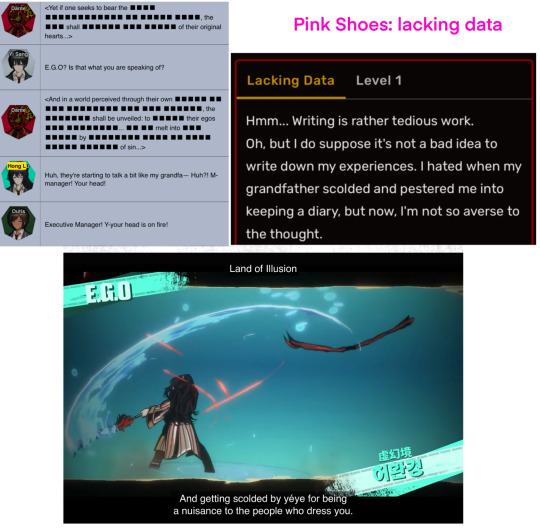
So we don’t really know which of his two grandfathers Hong Lu is referring to but knowing that in the novel only his paternal grandfather is mentioned and died before the novel begins, I think the "grandfather" Hong is talking about is Jia Daishan (and that he probably died in the world of Limbus Company too)
Jia Daishan:
Son of Jia Yuan
first Duke of Rong
husband of Grandmother Jia
father of Jia She, Jia Min and Jia Zheng
grandfather of the three first Spring Ladies (Jia Yuanchun, Jia Tanchun and Jia Yingchun), Jia Zhu, Baoyu, Daiyu, Jia Huan, Jia Lian
died before the beginning of the novel, reason why we don't know much about him
V/ Mention of his father in the game + comparison with the original work
LCB sinner, chatter#1
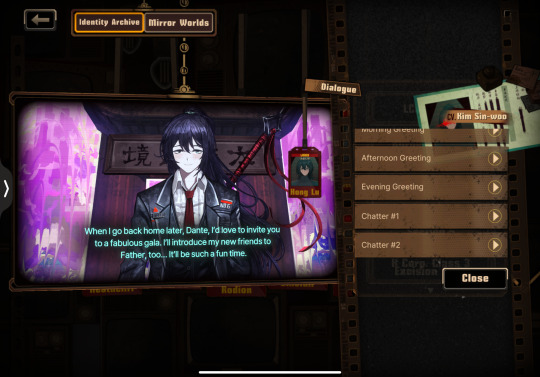
If Hong Lu is indeed the equivalent of Jia Baoyu in the world of limbus company, Hong Lu's father should be Jia Zheng:
Jia Zheng:
He is the second and youngest son of Jia Daishan and Grandmother Jia.
He has a wife, Lady Wang, and two concubines: Zhao (with whom he had two children) and Zhou
Father of Jia Zhu (deceased), Jia Yuanchun, Jia Baoyu, Jia Tanchun and Jia Huan
Confucianism had a great influence on him: he is a Confucian scholar who tries to be an upright and decent person, he fulfills his duties of filial piety towards the Dowager, and wants to educate his children strictly
Afraid his one surviving heir will turn bad, he imposes strict rules on his son (Jia Baoyu), and uses occasional corporal punishment.
Jia Baoyu is afraid of him
He has the ambition to become a good civil servant
But he lacks experience and is easily deceived by others, which earns him a bad reputation.
VI/ Mention of his siblings in the game + comparison with the original work
Main story, Canto III, episode: 2
Detour Tales, Chapter 5.5, episode: 13
Abn. Logs, Pink shoes: lacking data
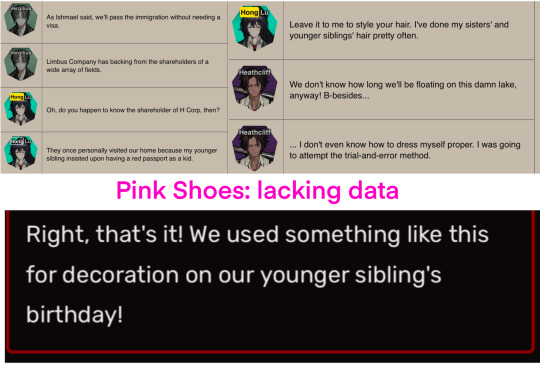
If Hong Lu is indeed supposed to be the Jia Baoyu of the world of Limbus Company, then, if we refer to the novel The Dream of the Red Room, Hong Lu should, like Baoyu, have 4 siblings:
Jia Zhu:
First son of Jia Zheng and Lady Wang
Big brother of Jia Baoyu and Jia Yuanchun and half-brother of Jia Tanchun and Jia Huan since they share the same father.
In the original novel, Jia Zhu is already dead prior to the action of the novel, so we know very little about him.
He had a son (Jia Lan) with Li Wan
Jia Yuanchun:
First female family member of the quartet of "Springs", first daughter of Jia Zheng and Lady Wang
Big sister of Jia Baoyu and Jia Yuanchun and half-sister of Jia Tanchun and Jia Huan since they share the same father.
She is about 10 years older than Baoyu.
She was raised by her grandmother
As an older sister, she taught Baoyu to read and write when he was liitle like his mother would have done.
Originally one of the ladies-in-waiting in the imperial palace, Yuanchun is later promoted to the highest ranking of imperial concubine "Xiande”, having impressed the Emperor with her virtue and intellect.
Despite her prestigious position, Yuanchun feels imprisoned within the four walls of the imperial palace.
She died at the age of forty, following an illness, in total isolation.
Jia Tanchun:
Third female family member of the quartet of "Springs", second daughter of Jia Zheng and his concubine, concubine Zhao
Big sister of Jia Huan and younger half-sister of Jia Zhu, Jia Yuanchun and Jia Baoyu since they share the same father.
The fact that she is the daughter of a concubine is still such a burden that she often claims Lady Wang, Baoyu's mother, as her own
Tanchun is a very clever and capable person, as much as Sister Phoenix for comparison
But, as the proverb says, "he who comes last will have fewer opportunities than the others", and this is what happened to her, because when her family declined she had not done much and she was sent to a distant region following an arranged marriage
Jia Huan:
Third son of Jia Zheng and his concubine, concubine Zhao
Little brother of Jia Tanchun and younger half-brother of Jia Zhu, Jia Yuanchun and Jia Baoyu since they share the same father.
More info just below
VII/ Mention of his brother (Jia Huan) in the game
Main story, Canto I, episode: 30
Main story, Canto V, episode: 18 (there we don’t know if he is talking about Jia Huan or not but there are not many other options and from what we can deduce from Jia Huan’s behaviour (in game and in the book too) it’s not very out off character)
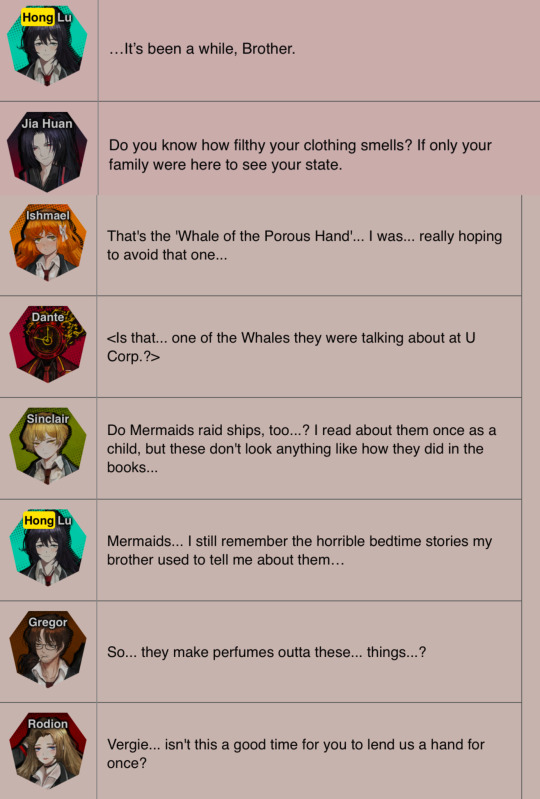
Jia Huan:
Third male family member of the generation of the Jia household, son of Jia Zheng and his concubine, concubine Zhao
Little brother of Jia Tanchun and half-brother of Jia Zhu, Jia Yuanchun and Jia Baoyu since they share the same father.
He is described as ugly and clumsy
He and his mother are both reviled by the family, and he carries himself like a kicked dog.
He is very cunning but mediocre, he shows his malignant nature by spilling candle wax, intending to blind his half-brother Baoyu
That’s all! If I have forgotten any moments where Hong Lu talks about his family, don't hesitate to tell me and I will add it! Also, I tried to verify and proof-read all the info and everything should be correct but if I made a mistake feel free to point it out to me :)
#limbus company#hong lu lcb#project moon#dream of the red chamber spoilers#tw: blood#tw: mentions of abuse#not an analysis but how could I call that#a database??
39 notes
·
View notes
Text
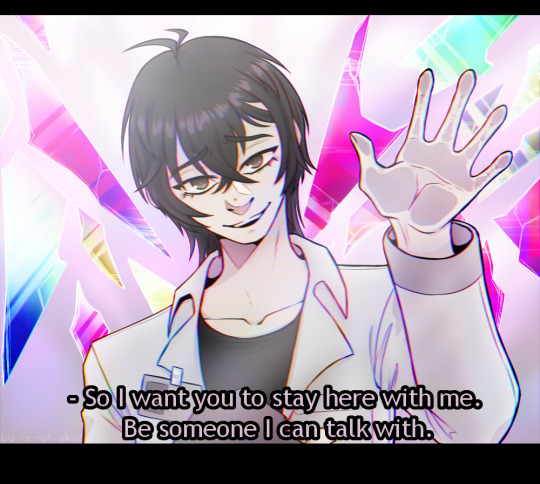
This fucking guy.
Anyway have some of my incoherent ramblings about this man under the read more because I have a lot to say about him.
Alright, let me split this into three sections because otherwise this ramble will be even more of a mess than it already is.
I'm gonna discuss Yi Sang in the mirror, or Sang Yi, under a couple of different lights.
One, how he relates to the concept of being the opposite reflection to Yi Sang. Two, how he ties back to Yi Sang's wife from "The Wings". And three, some of my thoughts about how he might fit into the wider scope of the plot and world of Limbus Company.
Strap in lads.
Sang Yi as a "left-handed" reflection
Something that becomes increasingly clear as we're shown interactions between Yi Sang and Sang Yi, and what is directly spelled out by the latter at the end of Canto IV's dungeon, is that Sang Yi is effectively the antithesis of much that makes Yi Sang, well... Yi Sang.
Yi Sang, at the core of everything, is a very sentimental and kind man. He cares a lot about the people around him, even if he doesn't always show it outwardly, and struggles to move on from whatever losses he experiences. Though he may claim otherwise, he's also constantly thinking about everything he's going through, which is what eventually leads him to the Mirror as a form of escapism from his curel reality.
Sang Yi on the other hand... is none of that.
Most of the 'comforting' words or advice Sang Yi offers to Yi Sang can be boiled down to "Stop caring or thinking about every little thing.", a sentiment that's directly in opposition of who Yi Sang is as a person.
Sang Yi finds the idea of feeling joy or despair over the past pointless. He thinks Yi Sang shouldn't feel guilty about his technology being used to exploit others because he already knew what he was getting himself into. He doesn't understand why Yi Sang would have trouble moving on if he were to lose Sang Yi.
Whereas Yi Sang is caring and emotionally-driven, Sang Yi is... I don't want to say uncaring, since he does seem to care about Yi Sang to some degree, but at the very least he is rather distant and logically-driven.
I think the moment that exemplifies that the most is when Yi Sang tells him Gubo doesn't care about him beyond using him as an accessory to prop himself up in the limelight, to which Sang Yi responds that it doesn't matter, that Yi Sang should use this as an opportunity to be in that limelight as well.
And, actually, speaking about that. Sang Yi doesn't really seem to think things through nearly as much as Yi Sang does. Or, at the very least, he doesn't care to look deeper than the surface level.
Sang Yi sees Gubo's attempts at connecting with Yi Sang as genuinely caring about him, whereas Yi Sang is able to see through them and realize Gubo is being entirely selfish here. Sang Yi sees the new League of Nine as something worth joining, while Yi Sang notices that it is nothing but a mockery of the old League. When Sang Yi learns of the new League's plan to destroy mirror worlds, his only reaction is that of mild curiosity without even a sign of concern.
All that being said, the biggest example of this might just be the fact that Sang Yi did not even realize just how badly Yi Sang was feeling until Yi Sang straight up told him there was nothing left for him in this world outside of Sang Yi.
Though we can't know for sure what exactly Sang Yi was feeling at the time, as all that we know about him is colored by Yi Sang's own bias towards him, I think it's fair to say that was the moment where it finally hit Sang Yi just how badly he fucked up by keeping Yi Sang stuck there all to himself.
Which, now that I think about it, transitions nicely to the other angle I want to look at.
Sang Yi as Yeongsim / Yi Sang's wife
First of all, just to lay it out there in the open, as fucking hilarious out of context as it sounds to say Yi Sang was his own wife all along, it's... actually not all that far off.
Beyond the fact that the Mirror is directly named after his wife in "The Wings", there's some other obvious signs that point to it. If you were to take the letters Yi Sang was writing to Sang Yi out of context, you could absolutely mistake them for something one would write to a lover too far away to be easily reachable. Plus, the way Yi Sang's first reaction to seeing Sang Yi is to call him "beautiful" in his mind?
Yeah, there's something to that.
And, of course, there's something to be said about the similarities between Sang Yi's role in Yi Sang's life, and the role Yi Sang's wife played in "The Wings".
That being the way both of them end up isolating Yi Sang, how both of them actively withhold information from him, and how Yi Sang sees them as perfect and without a fault even as they're hurting him.
I don't feel like talking about "The Wings" in depth right now as it's almost 5 am and I want to actually finish writing this fucking post at some point, but if you want to know what I'm comparing Sang Yi to, it's a short read that's easy to find a free pdf online for.
The fact that Sang Yi was trying to keep Yi Sang inside is probably the most spelled out one out of everything I'm talking about in this post. Not only does Sang Yi directly tell Yi Sang to stay with him (mind you he doesn't even ask), but Ishmael, as an outside observer, notes how Sang Yi was trying to keep Yi Sang in the room by making him afraid of the outside.
Actually, looking at when he finally offers Yi Sang the choice to leave, it's in a... very interesting way, shall we say?
Not only does Sang Yi try to make the option of staying sound as appealing as possible by bringing up that Yi Sang will be able to continue doing what he loves (or at least what Sang Yi believes Yi Sang loves), like continue working on the Mirror and keep talking to him.
On the other hand, Sang Yi is reluctant to even bring up the option that Yi Sang can leave, and when Yi Sang shows interest (note that Yi Sang's immediate reaction isn't a "I don't want to leave", it's a "I don't think I can leave"), he continues to make the option sound as unappealing as possible, while still making it clear that it is possible.
How Yi Sang doesn't need to be able to fly to leave, but he will struggle endlessly if he does. How Yi Sang can eventually find somewhere to call his home, but he will have to walk until his feet hurt and will have to settle for wherever or whatever he ends up resting at.
I don't know about you, but that doesn't seem like the kind of encouragement or advice someone who had a person's best interest in mind would make.
Now, let's make some other facts clear while we're at it.
Sang Yi knew that Yi Sang had wings as well, after all, he calls that fact 'obvious' when he finally mentions it. However, he never directly told him he does, even as Yi Sang lamented to him about how (in his eyes) he himself had no wings. He only brings it up when Yi Sang is truly at his lowest.
Sang Yi knew what the effects of supplements Yi Sang was taking were, as he can tell exactly what will happen if Yi Sang stops taking them, or takes several at once. However, he never directly told him this until he gives Yi Sang a choice, even though he was clearly aware they were not beneficial.
Sang Yi knew that Yi Sang's room was always open, as he was confident that Yi Sang would be able to just leave on his own once the effects of the supplements cleared away. However, he never tells Yi Sang that, even when Yi Sang is making it clear he doesn't think he even can leave. It's actually one of the thing Yi Sang ends up finding out by himself.
Despite all of this... Yi Sang never stops to consider that Sang Yi might not have his best interests in mind. Sang Yi is his everything. He's perfect, flawless, the ideal self. He's the only thing Yi Sang has left.
Call me cynical, but it paints the ending of the Canto in a somewhat bittersweet light to me. After all, Sang Yi never has to apologize or even admit to anything, and Yi Sang still views him as positively as he always has.
I guess at the very least it's accurate to the book. After all, Yi Sang in "The Wings" ends up holding on to that perfect image of his wife to the very end.
Sang Yi as an entity
Okay I have no clever transition here like I did last time, but this is probably the thing about Sang Yi that's been bugging me the most.
Have you guys noticed just how much Sang Yi seems to know about Yi Sangs from different worlds? Those sweeping general statements about "All versions of Yi Sang" or "All Yi Sangs" that he makes with full confidence.
When Yi Sang assumes that Sang Yi can "be anywhere he wants" thanks to his wings, just how correct is he?
With the way Sang Yi talks about other Yi Sangs, it gives the impression that he's met a lot of them in the past. In fact, if that's true, it would recolor the meaning of Sang Yi's comment about his meeting with his particular Yi Sang "peculiar".
What's so peculiar about our Yi Sang specifically, if Sang Yi has met so many of them? Is it the method, the fact that it's through the mirror? Is it that Sang Yi finally found a Yi Sang that also had wings? Is it because our Yi Sang is the first one to contact him rather than the other way around?
And while we're on that topic, isn't the way Sang Yi talks about Yi Sangs kind of odd? It's always "All Yi Sangs" or "All versions of Yi Sang", as if he's not part of those Yi Sangs himself. It's like he's putting himself in the role of an outside observer, seperate from the concept of being a 'Yi Sang'.
Just what is Sang Yi, really? He implies he's the version of our Yi Sang that's inside the mirror, the one that "needs to be opposite, yet is quite alike" to the one outside, to explain why our Yi Sang would have wings if he saw them on Sang Yi, but like... He never directly says that's the case.
In fact, when Yi Sang asks Sang Yi about what the outside is like, Sang Yi weirdly dodges the question, saying it's all "the same tiring stuff". Another example of him withholding information aside, this all makes him seem rather fucking suspicious to me.
Just. What is he really?
God I hope we get to see him again, cause I really want to know what the fuck his actual deal is.
#limbus company#limbus company project moon#lcb spoilers#lcb canto iv#lcb season 2#lcb analysis#sang yi#sang yi lcb#mirror yi sang#eye strain#my art#lu speaketh#i want to put this man in a petri dish and study him under a microscope
382 notes
·
View notes